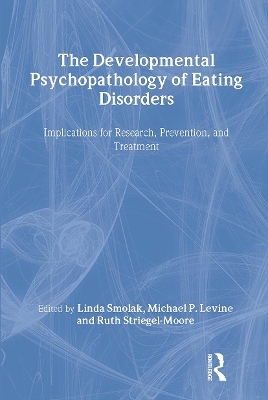
The Developmental Psychopathology of Eating Disorders
Routledge (Verlag)
978-0-8058-1746-1 (ISBN)
- Lieferbar (Termin unbekannt)
- Versandkostenfrei innerhalb Deutschlands
- Auch auf Rechnung
- Verfügbarkeit in der Filiale vor Ort prüfen
- Artikel merken
Although eating problems--ranging from body dissatisfaction and dieting to anorexia nervosa or bulimia nervosa--can begin and typically have their roots in childhood, theory and research in developmental psychopathology and developmental psychology have not received substantial attention in eating disorders research. This book provides crucial background material from both fields, and then makes direct applications to numerous aspects of the field of eating disorders including theory, research, treatment, and primary prevention.
This book was born out of a transaction between frustration and optimism. The frustrations reflected the limitations of current knowledge about eating problems and disorders. Etiological "causes" which are sensitive and specific to eating disorders have been elusive. Although there is some understanding of risk factors, little is known about protective factors. This has made prevention, among other things, difficult. Furthermore, the mechanisms underlying the association between risk factors and disordered eating are poorly understood. For example, it is known that women are at greater risk than men are, but clinicians are hard- pressed to get beyond gender-based speculations and demonstrate why this is true.
The optimism grows from familiarity with the field of developmental psychopathology. It seems evident that this approach has much to offer the field of eating disorders. This book is an early step in the integration of developmental psychopathology into theorizing, research, treatment, and prevention of eating disorders. It addresses four specific goals:
* to introduce the principles and methodologies of developmental psychopathology,
* to review the work of developmental psychologists in several major areas of behavior relevant to understanding the causes, treatment, and prevention of eating disorders,
* to apply developmental psychopathology principles to the area of eating disorders, both in the form of theoretical models and in specific areas/issues raised by developmental psychopathology, and
* to discuss the implications of developmental approaches for prevention programs and treatments.
Michael P. Levine, Linda Smolak, Ruth H. Striegel-Moore
Contents: Introduction. Part I: Introduction to Developmental Psychopathology.K. Rosen, The Principles of Developmental Psychopathology: Illustration From the Study of Eating Disorders. L. Smolak, Methodological Implications of a Developmental Psychopathology Approach to the Study of Eating Problems. Part II: Contributions From Developmental Psychology.R. Rende, Liability to Psychopathology: A Quantitative Genetic Perspective. T.J. Berndt, S.L. Hestenes, The Developmental Course of Social Support: Family and Peers. F. Ewell, S. Smith, M.P. Karmel, D. Hart, The Sense of Self and Its Development: A Framework for Understanding Eating Disorders. J. Worell, J. Todd, Development of the Gendered Self. R.A. Isabella, Attachment, Organization, and the Coherence of Individual Development. L. Smolak, R. Striegel-Moore, The Implications of Developmental Research for Eating Disorders. Part III: Developmental Issues and Eating Disorders.L. Smolak, M.P. Levine, Adolescent Transitions and the Development of Eating Problems. M.P. Levine, L. Smolak, Media as a Context for the Development of Disordered Eating. R. Striegel-Moore, L. Smolak, The Role of Race in the Development of Eating Disorders. M.E. Connors, Developmental Vulnerabilities for Eating Disorders. Part IV: Implications for Treatment and Prevention.J.D. Killen, Development and Evaluation of a School-Based Eating Disorder Symptoms Prevention Program. C.M. Shisslak, M. Crago, L.S. Estes, N. Gray, Content and Method of Developmentally Appropriate Prevention Programs. K.M. Pike, D.E. Wilfley, The Changing Context of Treatment. M.P. Levine, L. Smolak, R. Striegel-Moore, Conclusions, Implications, and Future Directions.
| Erscheint lt. Verlag | 13.5.1996 |
|---|---|
| Verlagsort | New York |
| Sprache | englisch |
| Maße | 152 x 229 mm |
| Gewicht | 884 g |
| Themenwelt | Geisteswissenschaften ► Psychologie ► Entwicklungspsychologie |
| Medizin / Pharmazie ► Medizinische Fachgebiete ► Psychosomatik | |
| Medizin / Pharmazie ► Medizinische Fachgebiete ► Psychiatrie / Psychotherapie | |
| ISBN-10 | 0-8058-1746-8 / 0805817468 |
| ISBN-13 | 978-0-8058-1746-1 / 9780805817461 |
| Zustand | Neuware |
| Haben Sie eine Frage zum Produkt? |
aus dem Bereich


